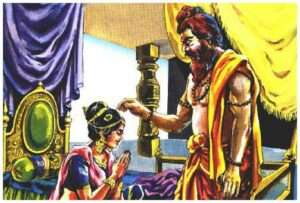Vicitravirya lived happily with his queens, but not for long. A deadly disease killed him while he was still very young.
Satyavati was desperate. She had lost her husband and two children in a very short time, and moreover the prestigious Bharata race was in danger of extinction. The only one who could restore it was Bhishma, but however much she tried to induce him to father children with his stepbrother’s wives, he vigorously rejected the idea, reminding his stepmother of the vow of brahmacarya.
The situation was serious. What could be done? At that point, with much hesitation, Satyavati revealed a secret to Bhishma.
“I think the time has come to confide in you something from my past that I have always kept silent from everyone. As you know, I was born of an Apsara, who after giving birth to me dropped me into the river, where I was swallowed by a fish. The fisherman who found me in the belly of the animal adopted me. At that time, I did not have the fragrant smell I have now, on the contrary I gave off an unbearable fishy stench. One day I was seen by the sage Parashara, who was attracted to me so much that he wished to have a child with me.
“I didn’t want to, but he convinced me, claiming that in addition to making me regain my virginity immediately after childbirth, he would also imbue me with a pleasant smell of forest flowers. So, I gave birth to a child who was given the names of Krishna Dvaipayana Vyasa. He became the glorious sage that you know well.
“Now, according to the Vedic rules, in times of exceptional situations, such as the ones we are facing, sages who are highly qualified can impregnate the queens in order to obtain high-quality offspring.
This is certainly the case with Vyasa, who is undoubtedly one of the most austere and spiritually advanced Rishis, as well as a member of our own family.”
Bhishma found the idea to be good and spoke to Ambika and Ambalika, who agreed. Satyavati sent messengers to his son’s hermitage, who, given the serious circumstance, approved the matter.
But there was one detail that would prove decisive: Vyasa was very tall, had a solemn bearing, and his appearance aroused fear; moreover, the harsh austerities he underwent had made his body really unpleasant to the eye. So, when he entered Ambika’s room during the night, the woman, seeing him in the dim light, felt her blood run cold with terror and closed her eyes.
At the first light of dawn Vyasa went to Satyavati.
“Your daughter-in-law, Ambika, was not able to tolerate seeing me,” the sage told her, “and when she saw me she closed her eyes. For this reason you will have a very strong grandson, but deprived of both material and spiritual sight.”
The next night, Vyasa entered Ambalika’s rooms, who could tolerate him more than her sister, but couldn’t avoid turning pale with fear.
“This second grandson of yours,” Vyasa later reported to his mother, “will be a great man, but since his mother has turned pale on seeing me, he will have a complexion as white as the moon, and besides, he will not be destined to live long.”
Over time Ambika gave birth to a son, blind as Vyasa had predicted, and was named Dhritarastra. Ambalika also gave birth to a boy who was named Pandu.
After the birth of the grandchildren, Satyavati again called Vyasa.
“Dear son,” she told him, “I am grateful to you for allowing Vicitravirya’s two wives to have children, thus avoiding the extinction of one of the noblest lineages of Bharata-varsha. However, Dhritarastra is blind and will not be able to rule normally, while Pandu, as you’ve predicted, will not live long. Therefore, give more children to the two queens; in this way there will be no risk and all this will not have been in vain.”
“I will do as you ask me,” replied the sage, “but it will be the last time, as Vedic injunctions prohibit such an act from being repeated more than three times. Tonight, I will visit Ambika again.”
Warned by Satyavati, the queen accepted on the spot but then, thinking back about Vyasa’s imperious and austere bearing, she was filled with dismay and regretted having accepted so readily. The very thought of this imminent meeting made her terrified. So, she convinced a friend, one of her attendants, to replace her in her room that night, sure that in the dark he would not recognize her.
Unexpectedly, the young lady did not find it so difficult; on the contrary, she was very cordial with the sage, who said to her:
“Since you have not been disturbed by my appearance and have only thought about doing good, you will have a very great son, who will be an incarnation of Dharmaraja, the god of justice.”
Eventually, a child was born who was named Vidura.
Soon after that birth, Vyasa returned to his Himalayan hermitage.
Time passed.
The three children grew up loved by all, and especially by their uncle Bhishma, who treated them as if they were his own children.
When the princes reached marriageable age, Bhishma was concerned about finding good wives for them.
Dhritarastra married Gandhari, the chaste daughter of king Subala of Gandhara. As soon as this pious woman learned that she would have a blind husband, she did not want to have anything that was not also in the possession of her husband and put on a blindfold, vowing never to take it off.
During the same period, Pandu, the second son, married Madri, the daughter of the king of Madra.
This is a section of the book “Maha-bharata, Vol. 1”.
To buy the complete book, click above




Leave a Reply